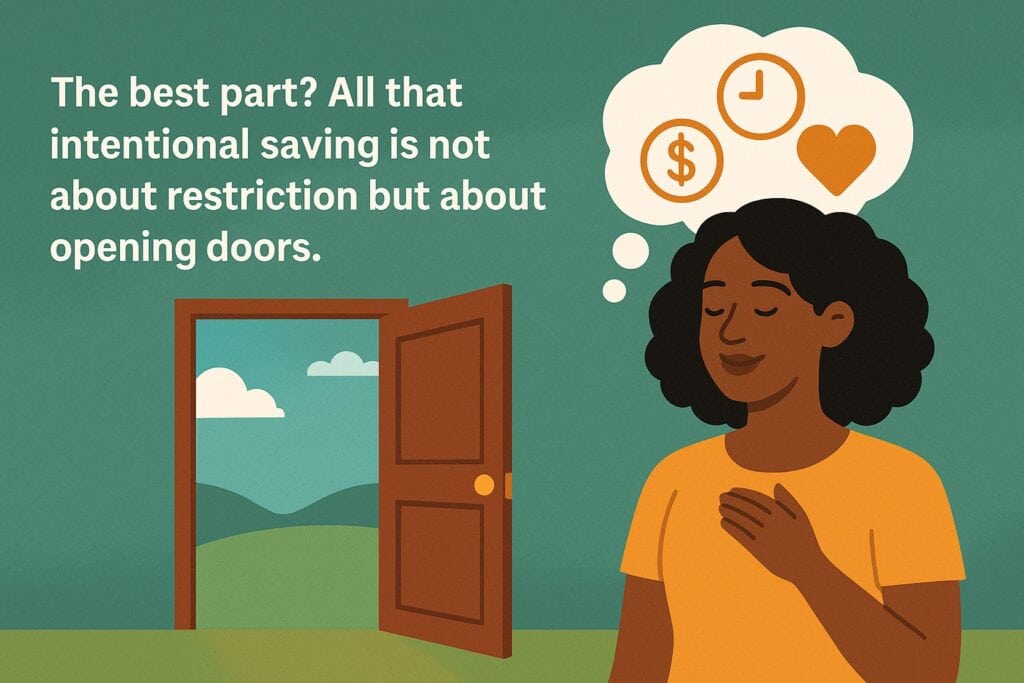Trying to save money should not feel like missing out on joy, comfort, or all the little things that make life sweet.
Maybe you’ve tightened your budget, skipped your favorite treats, or pushed self-care to the bottom of your list, hoping it’ll all be worth it when you check your savings account.
But what if I told you frugal living is not about sacrificing happiness but about smart choices that let you save more while still feeling taken care of and content?
Frugal living is not living with less but about making what you have work better for you. It’s about aligning your money with what truly matters and cutting out the noise (and the guilt).
Whether you’re looking to slash expenses, build a safety net, or simply feel more in control, frugal living can get you there without making life feel like a punishment.
What is frugal living? Let’s look at the definition!
Defining Frugal Living: Mindset Over Sacrifice
I’ve heard so many people sigh when they hear the word “frugal,” as if it means they’ll need to eat plain rice for every meal or give up on anything that feels remotely fun.
But that idea is all wrong. Frugal living isn’t a punishment but a mindset shift about what matters most.
When you focus on value rather than cost, you stop feeling deprived and start feeling empowered.
Let’s break down what frugal living really means, why it’s different from just being cheap, and how your mindset holds the key.
Myth-Busting: Frugal vs. Cheap
I used to think cutting costs meant grabbing the cheapest item on every shelf. Turns out, this approach usually backfires.
Here’s the thing: frugal people seek value. They look for quality, durability, and joy, not just the lowest price.
Here’s an example: I once bought a super cheap water bottle. It leaked everywhere after a week.
Later, I spent a bit more on a sturdy, well-made bottle and it’s lasted years. That’s frugal! I saved time, stress, and money in the long run.
Common myths about frugality:
- Frugal means poor quality: Not true. Frugal living is about choosing fewer, better things.
- Frugal people never treat themselves: Actually, they do! They just pick the treats that bring genuine happiness.
- Frugality means constant sacrifice: Real frugality is about smart choices, not endless “no’s”.
The Intentional Living Mindset
The biggest secret to saving without misery? It’s your mindset. When I stopped thinking of every cutback as a sacrifice and started seeing my spending as a way of voting for what truly matters, everything changed.
Frugal living means asking:
- Does this purchase fit my priorities?
- Would my future self thank me for this?
- Am I buying because I need it, or from habit or pressure?
I’ve made small changes over time. Like choosing home-brewed coffee over takeout or planning meals to waste less food. At first, it felt like a trade-off.
But soon, I realized I had more money (and less stress). I’m not missing out; I’m choosing what makes me feel good now, and later.
Key elements of the frugal mindset include:
- Intentional choices: Conscious decisions instead of impulse buys.
- Clear values: Knowing what matters most so it’s easy to skip what doesn’t.
- Gratitude: Appreciating the comfort I already have, not always chasing more.
- Flexibility: Allowing for fun and comfort. but on my own terms.
Why Frugal Living Matters: Emotional & Practical Benefits
Frugal living is about giving yourself the freedom to enjoy your days without a cloud of money stress hanging over you. It creates breathing room for what matters and lets you say “yes” to the things that truly lift you up.
Reducing Money Stress and Mental Clutter
There’s nothing relaxing about feeling uncertain every time you swipe your card or worrying that an unexpected bill could derail your whole month. When I started making more intentional spending choices, I noticed a little more calm with every decision.
Research backs this up, showing frugal habits really can lower your overall stress and bring more peace of mind.
Here’s how frugal living helps clear out mental clutter:
- Fewer impulsive purchases means less regret and less guilt.
- Clear budgets allow you to quickly see where your money goes.
- Consistent savings make unexpected expenses less intimidating.
- Less stuff at home means less to clean, organize, or worry about.
Did you know? Studies show that those who practice mindful spending experience improved mental health, with less anxiety and higher emotional well-being (source).
When you know where your paycheck is going and it matches your real priorities, it’s easier to rest at night.
If your money situation feels tangled, a few simple habits can help:
- Make a quick daily check-in with your budget (just five minutes).
- Pause before clicks and checkout, asking, “Does this align with my goals?”
- Organize financial paperwork once a week, so nothing piles up.
- Automate bills and savings so you don’t have to remember every task.
Choosing to live frugally is good for your wallet and provides a relief for your mind, too. When you clear away money stress, you free up space to start caring for yourself in better ways.
More Room for Self-Care and Meaningful Experiences
The best part? All that intentional saving is for restriction but about opening doors. When you cut costs that don’t matter, you create more time, money, and energy for things that fill you up.
Here’s what happens when you free up resources:
- You can afford quality time with people you love.
- It’s easier to treat yourself to rest or fun without guilt.
- You notice and enjoy the simple joys in everyday life.
For me, skipping a few daily takeout coffees meant I could plan a spa night at home or splurge on a cozy dinner with friends. That’s money well spent.
Intentional saving also gives you the chance to build better routines for your mind and body.
Imagine having the space to try new activities, pamper yourself, or focus on wellness without stressing about the cost.
My favorite way to start? Explore effective self-care practices that actually fit your life and budget.
If you want a few more ideas to make the most of your freedom:
- Set aside time for little pleasures, like walks or homemade treats.
- Invest in hobbies that recharge you, not just kill time.
- Organize your calendar for balance. Add fun and relaxation, not just chores.
When you save with purpose, you give yourself room to breathe, grow, and actually enjoy what you work so hard for.
And if your self-care or money routine could use a fresh perspective, remember to check out the Money and Self-Care Quiz for tips made just for you.
How to Practice Frugal Living Comfortably: Actionable Steps
Stripping joy and comfort from daily life is not the path to smart saving. If you equate frugal living with endless self-denial, it’s easy to miss how a few thoughtful steps can actually create a life you love, even while spending less.
Want to save thousands without feeling like you’re constantly saying “no”? It starts with knowing what matters, making mindful choices, and swapping out the things you won’t miss for comfort you’ll adore.
Prioritize What Matters Most: Identify Your Core Needs and Values
Before you begin slashing expenses, pause for a moment. Saving money should support, not sabotage what’s truly important to you.
I learned this the hard way: when I first decided to “get serious” about my finances, I tried to trim everything at once.
Pretty soon, I was grumpy and frustrated, eating bland meals, skipping all invitations, and missing out on the routines that kept me grounded.
One evening, I scribbled a quick “Top 5” list in my journal:
- Regular time with my closest friends.
- Good coffee at home.
- Feeling cozy and cared for in my space.
- Healthier homemade meals.
- A little fun money for books or treats.
With these priorities staring back at me, it was easier to make cuts elsewhere like cable TV, endless takeout, random online buys that I never really needed. I invite you to do the same.
Grab paper or open your notes app and write your top five must-haves. Which daily comforts or experiences truly bring you joy? What matters to your family, your health, your sense of peace?
Choosing to spend less doesn’t mean erasing these values. It means shining a light on them and letting everything else fall away.
Mindful Spending, Not Mindless Cutting
Frugal living is not about cutting for the sake of cutting. It’s about paying attention and making sure every dollar lines up with your real priorities. This approach changes everything. Let’s look at some real-life examples:
- Grocery shopping: Instead of grabbing whatever’s on sale, I plan out a few nourishing meals for the week. I skip snacks I rarely finish and stick to items I know will get eaten. The result? Less food waste and more meals I truly look forward to.
- Clothes shopping: Instead of bulk shopping, I save up for quality basics that last through years of washing. I now own fewer pieces, but I love and wear every single one.
- Entertainment: Swapping the default night out for game nights or movie streaming can be just as fun, minus the big spending.
Practicing mindful spending means asking yourself, “Will this make my life better today and tomorrow?” When you slow down and get intentional, it’s easier to spot those little leaks that drain your budget without adding any real happiness.
Building these habits has been a game-changer for me. If you want guidance on how to put this into practice, check out my write-up on mindful money habits. It’s packed with practical approaches to help you feel calm and confident with your spending.
Simplify and Swap: Little Changes, Big Impact
Comfort doesn’t have to come with a hefty price. Simple swaps deliver big results, often with more satisfaction and less hassle. Here are some of my favorite switch-ups that keep me feeling nurtured, not deprived:
- Meal planning: Swapping random food purchases for a simple weekly meal plan means I eat better and spend less. Cooking extra portions for leftovers saves me on busy days.
- Reusable over disposable: Bringing my own bags, water bottle, or coffee cup not only saves money but feels good for the planet and my routine.
- Fun at home: Swapping expensive nights out for themed potlucks, craft nights, or spa evenings brings friends together and memories to cherish, without the high price tag.
- Unplug to recharge: Opting for a walk in the neighborhood or reading a library book instead of online shopping soothes my mind and keeps my wallet happy.
- Quality over quantity: Having a few cozy throws and candles instead of constantly updating décor feels more luxurious and keeps things simple.
These changes are not about you giving things up. They’re about choosing what feels great while spending less. If you want to add more nurturing routines into your days, my post on Essential Self-Care Practices offers easy ideas that don’t cost much.
If you’ve ever felt like your budget just isn’t working or your self-care routine needs a refresh, I’ve got something perfect for you. I created a fun quiz designed specifically to help you pinpoint your budgeting blind spots and uncover your unique self-care style.
Take the Money and Self-Care Quiz now, and you’ll get personalized tips that genuinely match your personality. No one-size-fits-all advice here!
Balancing Frugal Living with Self-Care: Avoiding Burnout
Does being frugal sometimes feel like a tightrope walk between saving every penny and just craving a bit of comfort? I’ve been there, and it’s easy to slip into a pattern that feels more punishing than empowering.
Saving money should never come at the cost of your happiness or health. If you’re feeling a little stretched thin, it’s possible your efforts to be frugal are veering into the danger zone of “frugal fatigue.”
Let me walk you through the signs and share how I’ve learned to restore balance without sabotaging my goals.
Warning Signs of Frugal Fatigue
Sometimes saving so hard for the future can leave you running on empty. It sneaks up quietly, like skipping one too many simple pleasures or feeling guilty for even small treats. If you notice these signs in yourself, it may be time to pause and reconsider:
- Constant guilt over any spending: Even basic needs or tiny pleasures feel wrong to buy.
- Loss of joy in former hobbies: If things that used to make you smile now seem “too expensive,” you’re probably going overboard.
- Skipping important self-care: Saying no to rest, good food, or time with friends because of cost.
- Feeling isolated or resentful: Turning down all social invites, or feeling left out because money worries dominate.
- Money stress turning into exhaustion: Bills, budgets, or even grocery shopping bring on anxiety or dread.
- Impulse splurges: Ironically, extreme deprivation often leads to spending binges that undo all your hard work.
- Apathy or burnout: If you’ve stopped caring whether goals are even worth it, it might be classic frugal fatigue.
Learning to spot these signs helps you pull back before you crash. It’s okay to save, but not at the expense of your mental well-being.
For more insights, see how others are coping with frugal fatigue and how burnout can sneak into even the best intentions.
Frugal Self-Care Rituals to Recharge and Restore
Photo by Nataliya VaitkevichYou don’t need a fancy spa day or pricey products to refill your cup. Some of the best self-care fits perfectly with a frugal mindset. Here are easy and affordable ways I’ve restored my energy, even on the tightest budget:
- Journaling: Grab a notebook and spend five minutes jotting down worries, wins, or gratitude. It clears mental clutter and keeps you grounded. No spend required.
- Walking outdoors: Nature is free. Head for a stroll around your block or local park. Fresh air and movement can work wonders for your mood.
- Creative hobbies: Pick up that library book, start doodling, or rewatch your favorite comfort movie. Creative time, even if it’s just coloring or a kitchen experiment, recharges you.
- Music and meditation: Free playlists or guided meditations online make it easy to relax. Sometimes, I just lie down, close my eyes, and enjoy a song that lifts my spirits.
- DIY spa nights: A warm bath, homemade face masks, or simple stretches before bed lets your body know it matters, no matter your budget.
- Unplug and connect: Reach out to a friend for a chat or enjoy quality time with family. Relationships feed our well-being.
- Tidy up small spaces: Sometimes, just making your bed or clearing a nightstand calms the chaos. Small wins add up!
The magic comes from consistency and permission. Make these little rituals non-negotiable, the way you’d protect other priorities.
If you’ve ever felt like your budget just isn’t working or your self-care routine needs a refresh, I’ve got something perfect for you. I created a fun quiz designed specifically to help you pinpoint your budgeting blind spots and uncover your unique self-care style.
Take the Money and Self-Care Quiz now, and you’ll get personalized tips that genuinely match your personality. No one-size-fits-all advice here!
Pin this page, text it to a friend, or share with a group who could use more self-care and breathing space in life. Your support grows a kind space for women ready to put themselves first. Subscribe, share, and let’s create routines that feel good—together.
Final Thoughts
Frugal living is not about denying yourself comfort or joy. It’s about building a life that feels good, inside and out, while keeping more money in your pocket.
When you start making mindful, values-driven choices, you create space for the things that matter most like self-care, connection, and real confidence.
It’s not about counting every dollar or living with less just for the sake of saving. The real reward is peace of mind and the freedom to enjoy every part of your life, without the constant pressure of money stress.
If you’re stuck on the difference between frugal and cheap, check out this handy discussion on frugal vs. cheap. It offers some thoughtful real-life comparisons.
For more on how changing your attitude can transform your money habits, take a look at this resource on the mindset of frugal living.
If you’ve ever felt like your budget just isn’t working or your self-care routine needs a refresh, I’ve got something perfect for you. I created a fun quiz designed specifically to help you pinpoint your budgeting blind spots and uncover your unique self-care style.
Take the Money and Self-Care Quiz now, and you’ll get personalized tips that genuinely match your personality. No one-size-fits-all advice here!
Self-care and money management go hand-in-hand, so you might also find Mastering Self-Care Tips or these financial wellness tips for a secure future helpful as you shape new habits.
And if you want to build unwavering confidence along your journey, try my favorite self-confidence building exercises to give your self-esteem a lasting boost.
Take the first step today. Small changes add up, and you don’t have to do it alone.
Love what you just read? Share it with someone who could use a little more self-care and breathing space in their life.
Feeling inspired to take charge of your finances? Pass it on.
Feeling inspired and ready to shine brighter? Spread the confidence!
Share this with someone who could use a gentle reminder of their worth and strength. Pin it, text it, or drop it in a group chat. Every share helps us build a supportive, uplifting community of women stepping boldly into their best selves.
Subscribe, share, and let’s cultivate unstoppable self-esteem—together.




